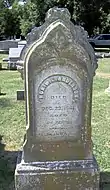William Clayton Anderson
William Clayton Anderson (December 26, 1826 – December 23, 1861) was a nineteenth-century slave owner,[1] lawyer, and politician. He served as a United States representative from Kentucky.
William C. Anderson | |
|---|---|
| Member of the U.S. House of Representatives from Kentucky's 4th district | |
| In office March 4, 1859 – March 3, 1861 | |
| Preceded by | Albert G. Talbott |
| Succeeded by | Aaron Harding |
| Member of the Kentucky House of Representatives | |
| In office 1851–1853 | |
| Personal details | |
| Born | December 26, 1826 Lancaster, Kentucky, US |
| Died | December 23, 1861 (aged 34) Frankfort, Kentucky, US |
| Resting place | Bellevue Cemetery, Danville, Kentucky, US |
| Political party | American Party, Unionist and Opposition Party |
| Parent | Simeon H. Anderson |
| Relatives |
|
| Alma mater | Centre College |
| Occupation | Lawyer, Politician |

Early life and career
Anderson was born in Lancaster, Garrard County, Kentucky, the son of Simeon H. Anderson and nephew of Albert G. Talbott.[2] He attended private schools and graduated from Centre College, Danville, Kentucky in 1845. He then studied law and was admitted to the bar. He began his practice in Lancaster and in 1847 moved to Danville and continued practicing law.
Anderson served as a member of the Kentucky House of Representatives from 1851 to 1853. He was a presidential elector on the American Party ticket of Millard Fillmore and Donaldson in 1856. An unsuccessful candidate for the Thirty-fifth Congress, Anderson was elected two years later as an Opposition Party candidate to the Thirty-sixth Congress, serving from March 4, 1859 to March 3, 1861.[3] He chose not to seek reelection; and was elected instead as a Unionist candidate to the Kentucky House of Representatives.[4]
Death
Anderson died on December 23, 1861 while on the house floor during a session of the legislature in Frankfort, Kentucky . He died three days before he would have been 35 years old. He is interred at Bellevue Cemetery in Danville, Kentucky.
References
- "Congress slaveowners", The Washington Post, 2022-01-13, retrieved 2022-01-15
- "William Clayton Anderson". The Political Graveyard. Retrieved 6 January 2013.
- "William Clayton Anderson". Govtrack US Congress. Retrieved 6 January 2013.
- "William Clayton Anderson". Biographical Directory of the United States Congress. Retrieved 6 January 2013.
Further reading
- Johnson, E. Polk (1912). A History of Kentucky and Kentuckians: The Leaders and Representative Men in Commerce, Industry and Modern Activities. Lewis Publishing Company. pp. 1122–1123. Retrieved 2008-11-10.
External links
- United States Congress. "William Clayton Anderson (id: A000237)". Biographical Directory of the United States Congress.
- Govtrack US Congress
- The Political Graveyard